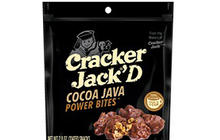http://www.cbsnews.com/news/dietary-supplements-health-risks-consumer-reports-15-ingredients-to-avoid/
A new investigation may have you rethinking some of your vitamins.
Consumer Reports finds certain ingredients in dietary supplements sold around the country can carry major health risks, including heart palpitations, allergic reactions and pain, reports CBS Sports' Dana Jacobson.
Eighteen-year-old Logan Stiner died after overdosing on a caffeine powder supplement he bought online.
A new study by Consumer Reports outlined health risks associated with dietary supplements -- including vitamins, probiotics and weight-loss aids. Unlike drug products that must be proven safe and effective, dietary supplements do not have to go through FDA approval.
"It's what you don't know - I think that's the thing that we're most concerned about," said Lisa Gill, deputy content editor at Consumer Reports. "Just because it's not prescription, you say, 'oh, it's safe,' but that's not necessarily true."
"What is the biggest misconception about supplements?" Jacobson asked.
"Oh, that they're safe. A manufacturer doesn't have to prove to the FDA before it gets put on the shelves -- that what's in those tablets, is what they say is there," Gill said.
A new study by Consumer Reports outlined health risks associated with dietary supplements -- including vitamins, probiotics and weight-loss aids. Unlike drug products that must be proven safe and effective, dietary supplements do not have to go through FDA approval.
"It could be adulterated, it could be counterfeit, it could be hiding prescription drugs," Gill said.
Consumer Reports worked with independent doctors and dietary experts to identify 15 ingredients they say consumers should always avoid. They include caffeine powder found in some weight-loss supplements - like Kava, which claims to reduce anxiety and red yeast rice in supplements, which claims to reduce cholesterol.
Gill urges consumers to always avoid these 15 ingredients.
"They are known to have very specific harms. In some cases they can cause seizures or they can cause liver or kidney damage, there have been deaths associated with each of these," Gill said.
But they found all 15 ingredients are available in supplements online or in major retailers. The Council for Responsible Nutrition -- which represents the supplement industry -- responded in a statement:
"More than 150 million Americans take dietary supplements each year... Overwhelmingly, dietary supplements are safe and play a valuable role in helping Americans live healthy lifestyles."
But Dr. Pieter Cohen, an assistant professor at Harvard Medical School, disagrees.
"Consumers need to know that they cannot trust that anything sold as a supplement is what's actually listed on the label," Cohen said. "Nor that it works. Or that it's safe."
The FDA acknowledged its limited role in regulating the industry, saying "it's important to remind consumers, that just because you can buy supplements in stores doesn't mean the FDA has reviewed them for safety or efficacy."
Gill recommends consumers look for the United States Pharmacopoeia or USP label and consult a medical expert.
"Tell your doctor and your pharmacist what you're taking. Treat it like a medication. It's that important -- it's really about your health," Gill said.
Consumer Reports finds certain ingredients in dietary supplements sold around the country can carry major health risks, including heart palpitations, allergic reactions and pain, reports CBS Sports' Dana Jacobson.
Eighteen-year-old Logan Stiner died after overdosing on a caffeine powder supplement he bought online.
A new study by Consumer Reports outlined health risks associated with dietary supplements -- including vitamins, probiotics and weight-loss aids. Unlike drug products that must be proven safe and effective, dietary supplements do not have to go through FDA approval.
- Dietary supplement use sends thousands to the ER each year
- Dietary supplements linked to increased cancer risk
- Teens turning to risky supplements to enhance looks
"It's what you don't know - I think that's the thing that we're most concerned about," said Lisa Gill, deputy content editor at Consumer Reports. "Just because it's not prescription, you say, 'oh, it's safe,' but that's not necessarily true."
"What is the biggest misconception about supplements?" Jacobson asked.
"Oh, that they're safe. A manufacturer doesn't have to prove to the FDA before it gets put on the shelves -- that what's in those tablets, is what they say is there," Gill said.
A new study by Consumer Reports outlined health risks associated with dietary supplements -- including vitamins, probiotics and weight-loss aids. Unlike drug products that must be proven safe and effective, dietary supplements do not have to go through FDA approval.
- Dietary supplement use sends thousands to the ER each year
- Dietary supplements linked to increased cancer risk
- Teens turning to risky supplements to enhance looks
"It could be adulterated, it could be counterfeit, it could be hiding prescription drugs," Gill said.
Consumer Reports worked with independent doctors and dietary experts to identify 15 ingredients they say consumers should always avoid. They include caffeine powder found in some weight-loss supplements - like Kava, which claims to reduce anxiety and red yeast rice in supplements, which claims to reduce cholesterol.
Gill urges consumers to always avoid these 15 ingredients.
"They are known to have very specific harms. In some cases they can cause seizures or they can cause liver or kidney damage, there have been deaths associated with each of these," Gill said.
But they found all 15 ingredients are available in supplements online or in major retailers. The Council for Responsible Nutrition -- which represents the supplement industry -- responded in a statement:
"More than 150 million Americans take dietary supplements each year... Overwhelmingly, dietary supplements are safe and play a valuable role in helping Americans live healthy lifestyles."
But Dr. Pieter Cohen, an assistant professor at Harvard Medical School, disagrees.
"Consumers need to know that they cannot trust that anything sold as a supplement is what's actually listed on the label," Cohen said. "Nor that it works. Or that it's safe."
The FDA acknowledged its limited role in regulating the industry, saying "it's important to remind consumers, that just because you can buy supplements in stores doesn't mean the FDA has reviewed them for safety or efficacy."
Gill recommends consumers look for the United States Pharmacopoeia or USP label and consult a medical expert.
"Tell your doctor and your pharmacist what you're taking. Treat it like a medication. It's that important -- it's really about your health," Gill said.


No comments:
Post a Comment